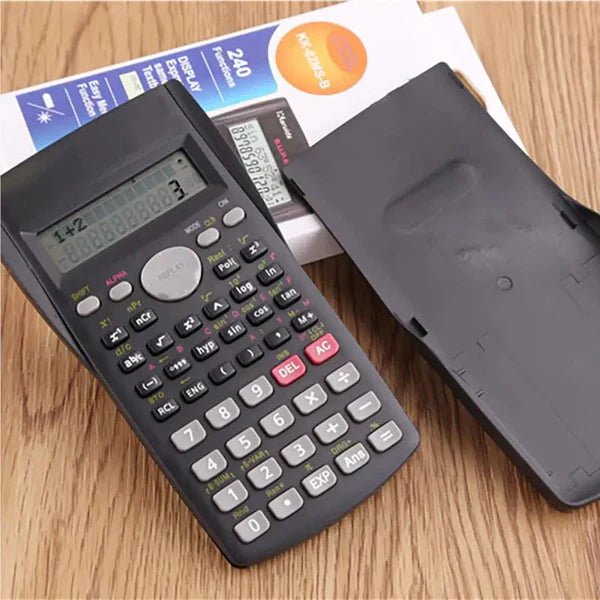
Why Every Student Needs a Scientific Calculator in Their Academic Toolkit
Share
Introduction
In an age where smartphones and apps dominate the tech space, it’s easy to forget the unmatched utility of a scientific calculator. Yet, for students navigating high school, college, or technical training, these powerful handheld tools remain indispensable.
Whether you're tackling complex algebra, engineering equations, or scientific notation, a scientific calculator delivers reliable, exam-safe precision that digital devices just can't match. Let’s explore why owning a high-quality scientific calculator is one of the smartest academic decisions you can make.
What Is a Scientific Calculator?
A scientific calculator is a specialized computing device that performs functions beyond basic arithmetic. With capabilities such as:
- Trigonometric calculations
- Logarithms and exponents
- Fractions and roots
- Statistical analysis
- Complex numbers
- Coordinate geometry
…it’s an essential companion for students studying math, science, engineering, and economics.
Unlike basic calculators, these are built for speed, efficiency, and exam compliance—making them ideal for standardized tests, class assignments, and daily coursework.
Top Benefits of Using a Scientific Calculator
1. Accuracy You Can Trust
Manual math can be prone to errors. Scientific calculators remove that risk by offering reliable, precise calculations—even for large and complex equations.
2. Time-Saving
Speed is critical during timed exams. These calculators help solve multi-step problems in seconds, boosting your productivity and confidence.
3. Compact and Portable
A scientific calculator fits into your backpack, pencil case, or pocket—ready to go wherever you are.
4. Exam-Friendly
Unlike smartphones or laptops, scientific calculators are allowed in most academic exams and standardized tests like SATs, ACTs, and A-levels.
5. Encourages Deeper Learning
By handling the complex math, the calculator allows students to focus on conceptual understanding and problem-solving.
Key Features to Look For
- Natural display for equations and fractions
- Multi-line view to see entire calculations
- Memory functions for recalling previous entries
- Mode switching for different functions (stat, sci, math)
- Durable battery or solar charging
Who Needs a Scientific Calculator?
- High school and college students
- Engineering and physics majors
- Business or economics students
- Teachers and tutors
- Anyone preparing for competitive exams
How to Use One Efficiently
- Start with the manual or guide—know your calculator’s layout.
- Practice switching modes (normal, scientific, statistical).
- Use parentheses to organize expressions.
- Learn to store/retrieve memory variables.
- Explore statistical functions for mean, median, and deviation.
Real Student Experiences
“I didn’t realize how much faster and clearer calculations could be until I started using my scientific calculator for trig. It’s like having a teacher in my hand.” – James, Manchester
“During my engineering finals, this calculator saved me loads of time and stress. Highly recommend it!” – Anjali, Birmingham
FAQs
Q1: Can I use a scientific calculator on exams?
Yes! Most educational boards allow it. Always double-check the rules before exam day.
Q2: Do they support graphing?
Basic scientific calculators do not. If you need graphing features, consider a graphing calculator instead.
Q3: How long do the batteries last?
Typically 2–3 years with regular use. Many models include solar backup.
Q4: Is a smartphone calculator the same?
No. Phones are often not allowed during exams and lack dedicated memory, display features, and reliability.
Q5: Are there models for left-handed users?
Yes! Many designs are ergonomically friendly and easy to use for everyone.
Final Thoughts
In today’s fast-paced academic world, precision and speed are critical. A scientific calculator isn't just a study tool—it's a bridge between understanding problems and solving them with confidence.
👉 Prepare smarter—get your scientific calculator now at CheckoutsUK.com
